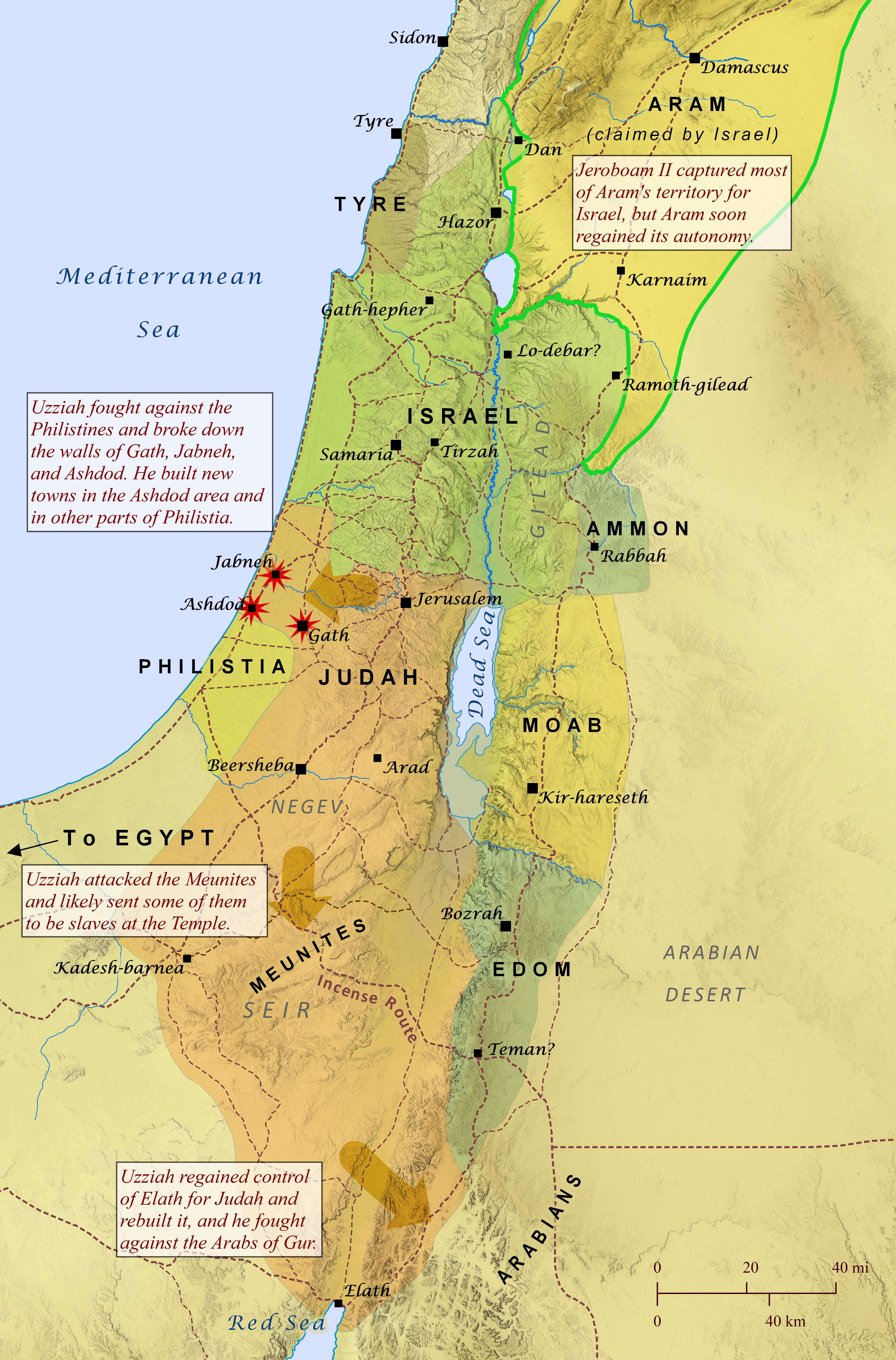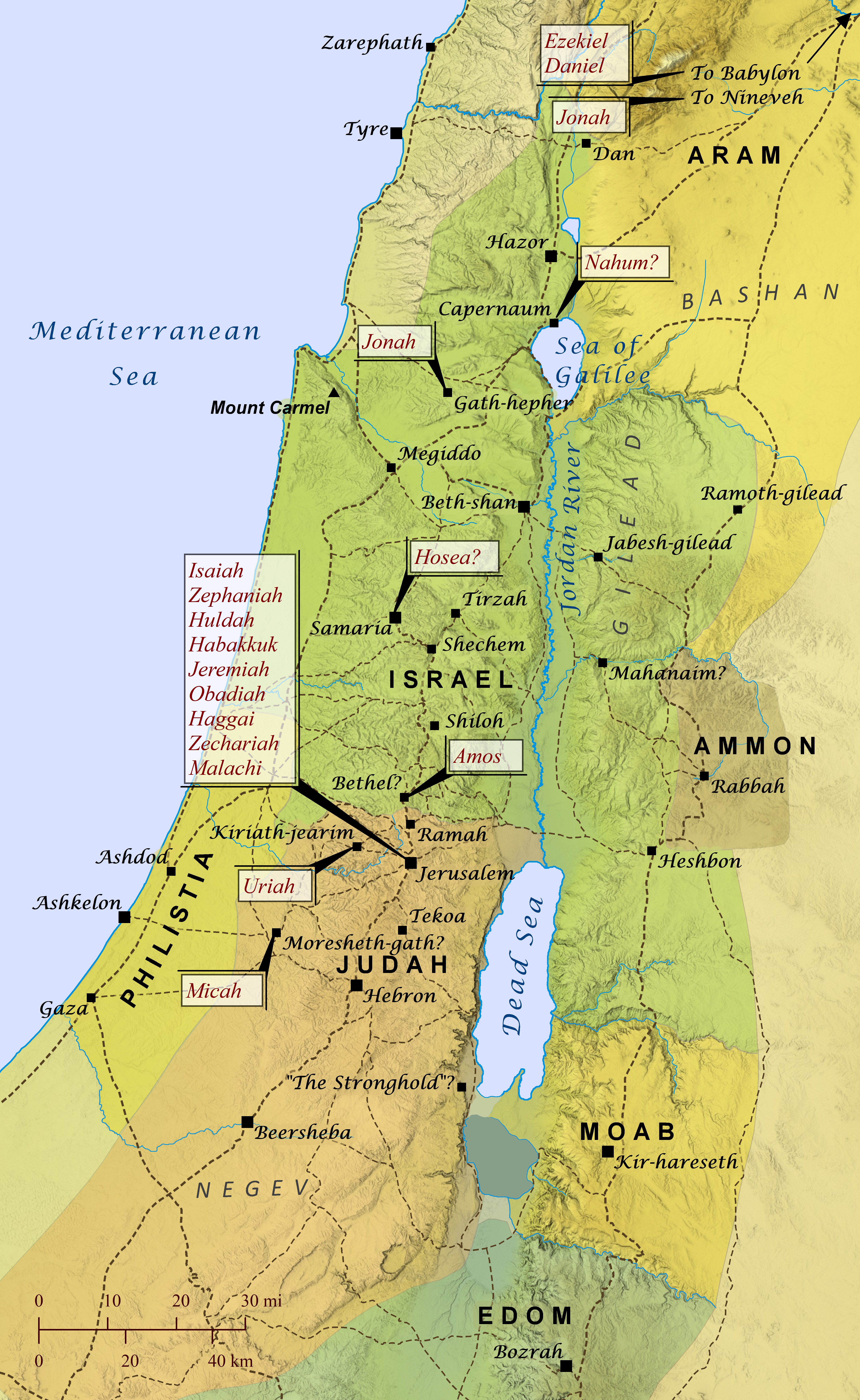Readers’ Version
Literal Version
14 In the second year of the reign of Yehoahaz’s son Yehoash over Yisrael, Amatsyah replaced his father Yoash as king of Yehudah. 2 He was twenty-five when he became king, and he reigned from Yerushalem for twenty-nine years. (His mother’s name was Yehoaddan from Yerushalem.) 3 He did what Yahweh had said was correct behaviour, although not as thoroughly as his ancestor David—his behaviour was more like that of his father Yoash. 4 However, the hilltop shrines weren’t removed—people were still sacrificing and burning incense at them.
5 Once he was firmly established as king, Amatsyah had the servants executed who had assassinated his father Yoash,[ref] 6 but he didn’t have their sons executed, because in the scroll where Mosheh had written the laws, Yahweh had commanded, “Fathers shouldn’t be executed for what their sons do, nor should sons be executed for the crimes of their ancestors—rather an individual should only be executed for their own crime.”
7 He led the victory over ten thousand Edomites in the Salt Valley, seizing Sela in the battle and renaming it as Yokthe’el which it’s still called today.
8 Then Amatsyah sent messengers to Yisrael’s King Yehoash (the son of Yehoahaz, the son of Yehu) challenging, “Come on, let’s have it out with each other.” 9 But King Yehoash replied to Yehudah’s King Amatsyah, “The thistle that was in the Lebanon forest sent to the cedar that was in the Lebanon, saying, ‘Give your daughter to my son as a wife.’ But a wild animal that was in the Lebanon passed by and it trampled the thistle. 10 It’s true that you won a battle with Edom and you’re feeling encouraged. Accept that honour, but stay home now. Why would you stir up trouble only to fall again—you and all Yehudah with you?”
11 But Amatsyah wouldn’t listen so the armies of Yisrael’s King Yehoash and Yehudah’s King Amatsyah faced each other in Yehudah at Beyt-Shemesh. 12 However, Yehudah was overcome by Yisrael, and its warriors had to flee home from the battlefield. 13 So Yisrael’s King Yehoash captured Yehudah’s King Amatsyah (the son of Yehoash, the son of Ahazyah) in Beyt-Shemesh. Then he went to Yerushalem, and he broke down the city wall from the Efrayim Gate up to the Corner Gate—almost two hundred metres of it. 14 He took all the gold and silver, and all the equipment that was found in Yahweh’s temple and in the palace treasuries. Then taking some hostages as well, he returned to Shomron (Samaria).
15 Everything else that Yehoash said and did, including his battle with Yehudah’s King Amatsyah, is written in the book of the events of the kings of Yisrael. 16 Then Yehoash died and was buried in Shomron with the former kings of Yisrael, and his son Yarave’am replaced him as king.
17 Yehudah’s King Amatsyah (Yoash’s son) lived another fifteen years after the death of Yisrael’s King Yehoash (Yehoahaz’s son). 18 Everything else that Amatsyah said is written in the book of the events of the kings of Yehudah.
19 Some people in Yerushalem had plotted to assassinate him, but he fled to Lakish. However, they followed him there and killed him in the city. 20 His body was carried back on horses, and he was buried in his ancestral tomb in Yerushalem in the city of David. 21 Then all the people of Yehudah took sixteen year old Azaryah and made him king to replace his late father Amatsyah. 22 Azaryah built up Eylat and he reestablished it as part of Yehudah before he died.
23 In the fifteenth year of Yoash’s son King Amatsyah’s reign over Yehudah, Yehoash’s son Yarave’am became king of Yisrael and reigned from Shomron (Samaria) for forty-one years. 24 He did what Yahweh had said was evil—he imitated the customs of Nebat’s son Yarave’am who’d caused Yisrael to sin. 25 Yarave’am restored Yisrael’s border from Lebo-Hamat through to the Sea of the Desert, as Yisrael’s god Yahweh had foretold via his servant Yonah (Jonah)—the son of the prophet Amittai from Gat-Hefer. 26 That was because Yahweh had seen how Yisrael had suffered badly and had been unable to control their own destinies, and that no other country would help them. 27 But Yahweh had said that he wouldn’t allow Yisrael to be destroyed, so he’d used Yehoash’s son Yarave’am to save them.
28 Everything else that Yarave’am said and did, including how he fought and restored Damascus and Hamat to Yisrael, is written in the book of the events of the kings of Yisrael. 29 Then Yarave’am died and was buried with the former kings of Yisrael, and his son Zekaryah replaced him as king.
2 A_son_of twenty and_five year[s] he_was in/on/at/with_became_king_he and_twenty and_nine year[s] he_reigned in/on/at/with_Yərūshālam/(Jerusalem) and_name_of his/its_mother was_Jehoaddan[fn] from Yərūshālam/(Jerusalem).
3 And_he/it_made the_right in/on_both_eyes_of YHWH only not like_Dāvid his/its_father in_all that he_had_done Yōʼāsh his/its_father he_did.
4 Only the_high_places not they_were_removed still the_people were_sacrificing and_made_offerings in/on/at/with_high_places.
5 And_he/it_was just_as it_was_secure the_kingdom in_his/its_hand and_killed DOM servants_of_his the_killed DOM the_king his/its_father.
6 And_DOM the_children_of the_killers not he_put_to_death according_to_the_written in/on/at/with_book_of the_law_of Mosheh which he_commanded YHWH to_say not they_will_be_put_to_death parents on children and_children not they_will_be_put_to_death on parents if/because (if) each in/on/at/with_sin_of_his_own he_will_be_put_to_death[fn].
7 He he_defeated DOM ʼEdōm in_the_Valley_of_Salt_in_the_Valley_of Salt[fn] ten_of thousand(s) and_took DOM the_Şelaˊ in/on/at/with_battle and_he/it_called DOM his/its_name Yāqətəʼēl/(Joktheel) until the_day the_this.
8 then ʼAmaʦyāh he_sent messengers to Yəhōʼāsh/(Jehoash) the_son_of Yəhōʼāḩāz/(Jehoahaz) the_son_of Yēhūʼ/(Jehu) the_king_of Yisrāʼēl/(Israel) to_say come let_us_look_at_one_another faces.
9 And_ Yəhōʼāsh _sent the_king_of Yisrāʼēl/(Israel) to ʼAmaʦyāh the_king_of Yəhūdāh/(Judah) to_say the_thistle which in/on/at/with_Ləⱱānōn it_sent to the_cedar which in/on/at/with_Ləⱱānōn to_say give DOM daughter_of_your to_son_of_my to/for_(a)_woman and_ the_animal_of _passed_by the_field which in/on/at/with_Ləⱱānōn and_trampled DOM the_thistle.
10 Indeed_(defeat) you_have_defeated DOM ʼEdōm and_lifted_up_you heart_of_your be_honoured and_stay in/on/at/with_home_of_you and_for_what will_you_engage_in_strife in/on/at/with_trouble and_fall you and_Yəhūdāh/(Yihudah) with_you.
11 And_not ʼAmaʦyāh he_listened and_ Yəhōʼāsh _he/it_ascended the_king_of Yisrāʼēl/(Israel) and_met faces he and_ʼAmaʦyāh the_king_of Yəhūdāh in_house_of shemesh which belongs_to_Yəhūdāh.
12 And_ Yəhūdāh _defeated to_(the)_face_of/in_front_of/before Yisrāʼēl/(Israel) and_fled each to_tent_of_his[fn].
13 And_DOM ʼAmaʦyāh the_king_of Yəhūdāh the_son_of Yəhōʼāsh the_son_of ʼAḩazyāh Yəhōʼāsh he_seized the_king_of Yisrāʼēl/(Israel) in_house_of shemesh and_came[fn] Yərūshālam/(Jerusalem) and_broke_down in/on/at/with_wall_of Yərūshālam/(Jerusalem) in/on/at/with_gate_of ʼEfrayim to the_gate_of the_corner four hundred(s) cubit[s].
14 And_he/it_will_take DOM all_of the_gold and_the_silver and_DOM all_of the_vessels the_found the_house_of YHWH and_in/on/at/with_treasuries_of the_house_of the_king and_DOM the_sons_of the_hostages and_returned Shomrōn_to.
15 And_rest_of the_matters_of Yəhōʼāsh/(Jehoash) which he_did and_might_of_his and_which he_waged_war with ʼAmaʦyāh the_king_of Yəhūdāh/(Judah) not are_they written on the_scroll_of the_matters_of the_days of_kings_of of_Yisrāʼēl/(Israel).
16 And_ Yəhōʼāsh _slept with fathers_of_his and_buried in/on/at/with_Shomrōn with the_kings_of Yisrāʼēl/(Israel) and_ Yārāⱱəˊām/(Jeroboam) _reigned his/its_son in_place_his.
17 and_ ʼAmaʦyāh _he/it_lived the_son_of Yōʼāsh/(Joash) the_king_of Yəhūdāh after the_death_of Yəhōʼāsh the_son_of Yəhōʼāḩāz/(Jehoahaz) the_king_of Yisrāʼēl/(Israel) fif- teen year[s].
18 And_rest_of the_matters_of ʼAmaʦyāh not are_they written on the_scroll_of the_matters_of the_days of_kings_of of_Yəhūdāh.
19 And_they_conspired on/upon/above_him/it a_conspiracy in/on/at/with_Yərūshālam/(Jerusalem) and_fled Lākīsh_to and_sent after_him Lākīsh_to and_killed_him there.
20 And_brought DOM_him/it on the_horses and_buried in/on/at/with_Yərūshālam/(Jerusalem) with fathers_of_his in/on/at/with_city_of Dāvid.
21 And_ all_of _they_took the_people_of Yəhūdāh DOM ˊAzaryāh and_he was_a_son_of six- teen year[s] and_made_king DOM_him/it in_place_of his/its_father ʼAmaʦyāh.
22 He he_built DOM ʼĒylōt and_restored_it to_Yəhūdāh after lay_down the_king with fathers_of_his.
23 in_year fif- teen year of_ʼAmaʦyāh the_son_of Yōʼāsh the_king_of Yəhūdāh/(Judah) Yārāⱱəˊām he_became_king the_son_of Yōʼāsh the_king_of Yisrāʼēl/(Israel) in/on/at/with_Shomrōn forty and_one year[s].
24 And_he/it_made the_evil in/on_both_eyes_of YHWH not he_turned_aside from_all the_sins_of Yārāⱱəˊām/(Jeroboam) the_son_of Neⱱaţ which he_caused_to_sin DOM Yisrāʼēl/(Israel).
25 He he_restored DOM the_border_of Yisrāʼēl/(Israel) from_lebo_of Ḩₐmāt to the_sea_of the_ˊₐrāⱱāh according_to_message_of YHWH the_god_of Yisrāʼēl/(Israel) which he_spoke in/on/at/with_hand_of servant_of_his Yōnāh/(Jonah) the_son_of ʼAmittay the_prophet who from_Gat- hepher.
26 If/because YHWH he_saw DOM the_affliction_of Yisrāʼēl/(Israel) rebellious very and_no_one was_shut_up and_whether was_freed and_no a_helper for_Yisrāʼēl/(Israel).
27 And_not YHWH he_had_spoken that_blot_out DOM the_name_of Yisrāʼēl/(Israel) from_under the_heavens and_saved_them in/on/at/with_hand_of Yārāⱱəˊām the_son_of Yōʼāsh/(Joash).
28 And_rest_of the_matters_of Yārāⱱəˊām and_all that he_did and_might_of_his which he_waged_war and_which he_restored DOM Dammeseq and_DOM Ḩₐmāt belonged_to_Yəhūdāh in/on/at/with_Yisrāʼēl/(Israel) not are_they written on the_scroll_of the_matters_of the_days of_kings_of of_Yisrāʼēl/(Israel).
29 And_ Yārāⱱəˊām _slept with fathers_of_his with the_kings_of Yisrāʼēl/(Israel) and_ Zəkaryāh _became_king son_of_his in_place_his.
14:2 OSHB variant note: יהועדין: (x-qere) ’יְהֽוֹעַדָּ֖ן’: lemma_3086 n_0.0 morph_HNp id_12rrT יְהֽוֹעַדָּ֖ן
14:6 OSHB variant note: ימות: (x-qere) ’יוּמָֽת’: lemma_4191 n_0 morph_HVHi3ms id_12ywD יוּמָֽת
14:7 OSHB variant note: המלח: (x-qere) ’מֶ֨לַח֙’: lemma_4417 n_1.1.0 morph_HNp id_12yHv מֶ֨לַח֙
14:12 OSHB variant note: ל/אהל/ו: (x-qere) ’לְ/אֹהָלָֽי/ו’: lemma_l/168 n_0 morph_HR/Ncmpc/Sp3ms id_12frk לְ/אֹהָלָֽי/ו
14:13 OSHB variant note: ו/יבאו: (x-qere) ’וַ/יָּבֹא֙’: lemma_c/935 n_0.2.0 morph_HC/Vqw3ms id_12zbT וַ/יָּבֹא֙


